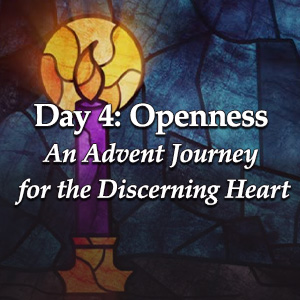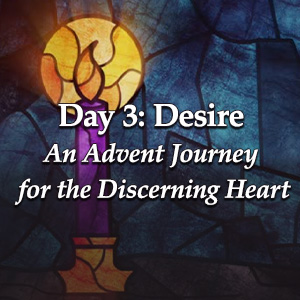Podcast: Play in new window | Download (Duration: 2:37 — 1.9MB) | Embed
Subscribe: Apple Podcasts | Spotify | Amazon Music | Android | Pandora | iHeartRadio | JioSaavn | Podchaser | Gaana | Podcast Index | Email | TuneIn | Deezer | Anghami | RSS | More

Day 4: Bringing Christ to the Everyday
“Sometimes it may seem to us that there is no purpose in our lives, that going day after day for years to this office or that school or factory is nothing else but waste and weariness. But it may be that God has sent us there because but for us, Christ would not be there. If our being there means that Christ is there, that alone makes it worthwhile.”
Commentary: Caryll Houselander speaks to those moments of monotony and purposelessness we all encounter, especially in routine or seemingly mundane work. She reminds us that even in the most ordinary tasks and places, there is a profound purpose when we recognize that Christ is present through us. Our mere presence in these spaces allows Christ to be there too, transforming what seems wearisome into an act of divine purpose. This perspective can reframe our understanding of vocation, showing that any role or task has sacred value when approached with awareness of Christ’s presence.
Personal Reflection: Reflect on a daily task or responsibility that feels tedious or insignificant. How might viewing it as a way of bringing Christ’s presence to that place change your perspective?
Houselander quote from: Caryll Houselander, A Rocking Horse Catholic by Caryll Houselander (2013) Paperback
For more reflections visit:
Caryll Houselander – Discerning Hearts Catholic Podcasts
Image © Trinity Icons / Joseph M. Malham
Image used with permission
To purchase your own copy, visit Trinity Icons


 We know that there are three comings of the Lord. The third lies between the other two. It is invisible, while the other two are visible. In the first coming he was seen on earth, dwelling among men; he himself testifies that they saw him and hated him. In the final coming all flesh will see the salvation of our God, and they will look on him whom they pierced. The intermediate coming is a hidden one; in it only the elect see the Lord within their own selves, and they are saved. In his first coming our Lord came in our flesh and in our weakness; in this middle coming he comes in spirit and in power; in the final coming he will be seen in glory and majesty.
We know that there are three comings of the Lord. The third lies between the other two. It is invisible, while the other two are visible. In the first coming he was seen on earth, dwelling among men; he himself testifies that they saw him and hated him. In the final coming all flesh will see the salvation of our God, and they will look on him whom they pierced. The intermediate coming is a hidden one; in it only the elect see the Lord within their own selves, and they are saved. In his first coming our Lord came in our flesh and in our weakness; in this middle coming he comes in spirit and in power; in the final coming he will be seen in glory and majesty. We have visited the villages of the new converts who accepted the Christian religion a few years ago. No Portuguese live here, the country is so utterly barren and poor. The native Christians have no priests. They know only that they are Christians. There is nobody to say Mass for them; nobody to teach them the Creed, the Our Father, the Hail Mary and the Commandments of God’s Law.
We have visited the villages of the new converts who accepted the Christian religion a few years ago. No Portuguese live here, the country is so utterly barren and poor. The native Christians have no priests. They know only that they are Christians. There is nobody to say Mass for them; nobody to teach them the Creed, the Our Father, the Hail Mary and the Commandments of God’s Law.




